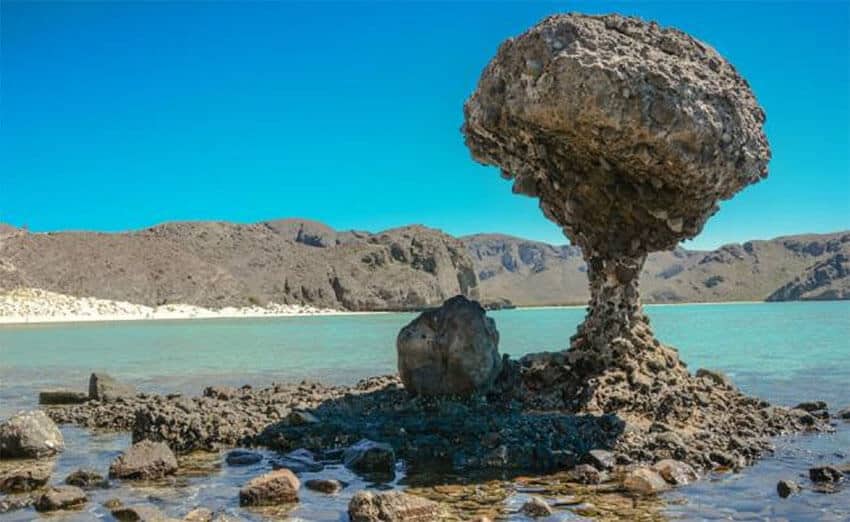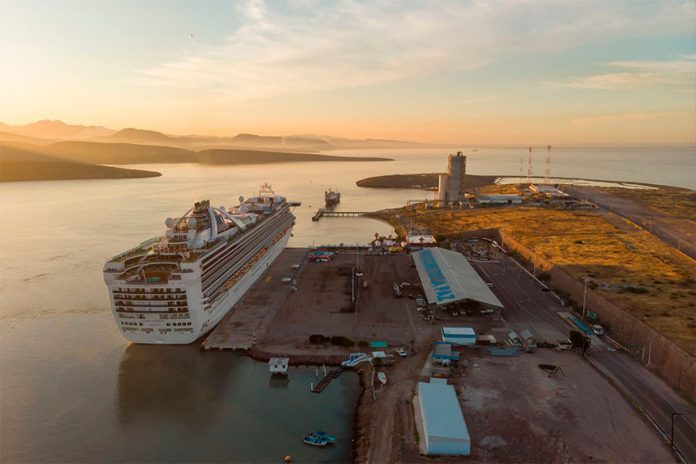A company that intended to build a new 1-billion-peso (US $50.6 million) cruise ship pier and terminal in La Paz, Baja California Sur, has withdrawn its plans, but environmentalists fear that it could revive the project sometime in the future.
Aquamayan Adventures, owned by businessman Isaac Hamui Abadi, planned to build a pier capable of accommodating two large cruise ships in Pichilingue, a Gulf of California port about 40 kilometers north of the city of La Paz.
The plan was met by significant opposition because the development, which was also slated to include restaurants, shops and other facilities for cruise ship passengers, would have impinged on the Balandra Flora and Fauna Protection Area, which includes a beach considered one of the most beautiful in the world.
The Baja California government announced in late March that Aquamayan Adventures had withdrawn its application to build the pier and asked the federal Environment Ministry (Semarnat) to terminate the environmental impact assessment it was carrying out to determine whether the project would be approved.
Mario Sánchez, regional director of the Mexican Center for Environmental Law (CEMDA), said the company’s decision confirmed that the project was incompatible with the natural environment. He also said that local planning regulations explicitly prohibit a project of the type Aquamayan Adventures intended to build.

“Economic and tourism development should not compromise the stability and proper functioning of ecosystems [and] the species that live in them,” Sánchez said, referring to marine animals such as whale sharks and bottlenose dolphins.
CEMDA and other groups asserted that the pier project would adversely affect the Balandra area as well as the whale shark sanctuary in La Paz Bay and the Espíritu Santo Archipelago National Park.
Activists participated in dozens of protests to denounce the project and thousands of state residents signed a petition against it. Semarnat held a public consultation process earlier this year that allowed environmental groups and citizens to raise concerns.
As part of its pier project, which was slated to simultaneously accommodate two cruise ships measuring up to 360 meters and carrying up to 6,000 passengers each, Aquamayan Adventures planned to dredge almost 80,000 cubic meters of La Paz Bay.
Local scientists said that dredging would contaminate the Gulf of California with mud and toxic insoluble hydrocarbons.
Scientists also said that Aquamayan Adventures’ environmental information didn’t outline the impact a proposed desalination plant would have on the Mogote-Ensenada de La Paz wetlands, a site protected by the Ramsar Convention on Wetlands of International Importance. Construction of a desalination plant was planned to provide fresh water to the cruise ship pier and terminal complex.
While groups and citizens opposed to the proposed development are happy with Aquamayan Adventures’ decision, Sánchez warned that it could be a “temporary victory” for environmentalists.
The CEMDA director and Alejandro Águila, an environmental engineer and head of a collective opposed to the pier project, believe that the company could seek approval for the development at a later date.
“It’s a strategy – we’ve experienced it in other processes before. They present the project, test the waters, see what [people] say, … withdraw it and rethink it,” Sánchez said.
Aquamayan Adventures has ample time to reconsider its plans. Via a competitive tendering process held last year, the company was awarded a 25-year concession for the area where it planned to build the new pier. Aquamayan Adventures, which paid 40 million pesos (US $2 million at today’s exchange rate) for the concession, has an option to extend it for an additional 20 years, according to the contract it signed.
